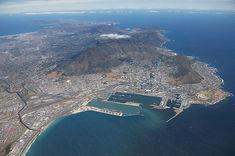
South Africa’s state-owned logistics provider Transnet has embarked on a R4.6bn (£382.4 million) expansion programme at the Port of Cape Town container terminal.
The works will increase the port’s container terminal capacity to 1.4 million TEUs a year by 2012 through a deepening of the harbour and upgrading quay facilities.
Sanjay Govan, Cape Town port manager said: “We are excited about the expansion as it will increase the handling capacity of all containerised shipping by around 40 per cent and that includes refrigerated shipping. The port will also increase the current plug-in points for refrigerated containers by roughly 35 per cent, extending the capacity from the current 2 ,000 points to 3, 000.”
One of the biggest challenges the port faces are high wind speeds which often delay loading. This problem will be addressed by the installation of new generation container cranes that are able to work in stronger wind conditions and the installation process is already underway.
Govan said: “The upgrade to our facilities will allow more vessels to berth and load simultaneously, depending on the vessel size. The increase in handling and storage capacity of containers should allow ships to load faster and allow for an increased handling capacity. We fully realise the time and price sensitivity of the fresh produce sector and thus we make every effort to accommodate these needs.
The expansion will be sufficient for the needs of the existing refrigerated reefer vessels load facilities until around 2017 and depending on market growth, additional plans are to expand these facilities further seawards.
In another logistics development, the South Africa’s fruit industry post-harvest innovation programme aims to increase the use of rail freight through its tonnage-off-tar initiative.
The aim is to provide a co-ordinated, reliable service to the fresh fruit sector and to this end the Fresh Produce Exporters’ Forum is working closely with Transnet, the farm ministry and the Perishable Products Export Control Board as well as shipping lines to make queues of lorries waiting to unload fruit at port-side a thing of the past. When the trains arrive in port, they can bypass queues and arrive at the siding for offloading without delay. As Transnet operates both the rail and port facilities, there is good level of operational co-operation.



